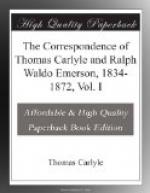I have parted with my horse; after an experiment of seven or eight months, most assiduously prosecuted, I came to the conclusion that, though it did me some good, there was not enough of good to warrant such equestrianism: so I plunged out, into green England, in the end of July, for a whole week of riding, an explosion of riding, therewith to end the business, and send off my poor quadruped for sale. I rode over Surrey,— with a leather valise behind me and a mackintosh before; very singular to see: over Sussex, down to Pevensey where the Norman Bastard landed; I saw Julius Hare (whose Guesses at Truth you perhaps know), saw Saint Dunstan’s stithy and hammer, at Mayfield, and the very tongs with which he took the Devil by the nose;—finally I got home again, a right wearied man; sent my horse off to be sold, as I say; and finished the writing of my Lectures on Heroes. This is all the rustication I have had, or am like to have. I am now over head and ears in Cromwellian Books; studying, for perhaps the fourth time in my life, to see if it be possible to get any credible face-to-face acquaintance with our English Puritan period; or whether it must be left forever a mere hearsay and echo to one. Books equal in dulness were at no epoch of the world penned by unassisted man. Nevertheless, courage! I have got, within the last twelve months, actually, as it were, to see that this Cromwell was one of the greatest souls ever born of the English kin; a great amorphous semi-articulate Baresark; very interesting to me. I grope in the dark vacuity of Baxters, Neales; thankful for here a glimpse and there a glimpse. This is to be my reading for some time.
The Dial No. 1 came duly: of course I read it with interest; it is an utterance of what is purest, youngest in your land; pure, ethereal, as the voices of the Morning! And yet—you know me—for me it is too ethereal, speculative, theoretic: all theory becomes more and more confessedly inadequate, untrue, unsatisfactory, almost a kind of mockery to me! I will have all things condense themselves, take shape and body, if they are to have my sympathy. I have a body myself; in the brown leaf, sport of the Autumn winds, I find what mocks all prophesyings, even Hebrew ones,—Royal Societies, and Scientific Associations eating venison at Glasgow, not once reckoned in! Nevertheless go on with this, my Brothers. The world has many most strange utterances of a prophetic nature in it at the present time; and this surely is worth listening to among the rest. Do you know English Puseyism? Good Heavens! in the whole circle of History is there the parallel of that,—a true worship rising at this hour of the day for Bands and the Shovel-hat? Distraction surely, incipience of the “final deliration” enters upon the poor old English Formulism that has called itself for some two centuries a Church. No likelier




